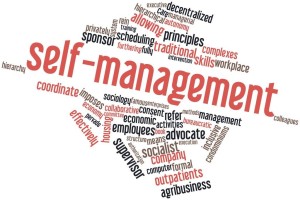 It is easy to believe that all leaders practice self-management, but that is not always the case!
It is easy to believe that all leaders practice self-management, but that is not always the case!
Self-management is a component of emotional intelligence. It is about the actions you take, or do not take. Self-management is focused on your ability to use your awareness of your emotions to stay flexible and ensure your behavior is positive. Self-management is about managing your emotional reactions to situations and people. It is an essential skill for anyone in a leadership role.
Leaders with high self-management:
- Manage their impulsive feelings
- Stay composed and positive even in stressful and trying situations
- Think clearly and stay focused when under pressure
- Admit their own mistakes and will confront unethical actions in others
- Take tough stands based on principle, even if that stand is not the popular one
- Hold themselves accountable for meeting objectives
- Can handle multiple demands, shifting priorities and rapid change more easily
Consider this example:
Alexander is in a mid-level leadership role in his organization. A number of his direct reports as well as his peers noted that when a situation is stressful or something goes wrong, Alexander responds very quickly and sharply. He doesn’t take any time to think through the situation first but rather is very emotional. Alexander seems to panic when stressed or faced with a tough situation. He communicates poorly with others during this time and makes them feel as if they are the problem. He cannot separate the people from the situation. He has had a number of verbal outbursts that were just uncalled for with many employees in the company. Alexander doesn’t seem to be a mean-spirited person. In fact, when things are going well he is great to work with and communicates just fine with others. It just seems that his emotions rule his every move. He doesn’t need to jump into every situation or solve every problem immediately, yet that is what he tries to do.
In this example, Alexander clearly has a problem managing himself. His inability to manage himself and the things he does, or does not do, will impact his ability to be effective in his organization and to eventually reach a senior leadership role.
Self-management is our ability to use awareness of our emotions to choose what we say and what we do. Here are just a few ways to develop your ability to better manage yourself and your emotions:
- Many times we allow emotions to sway us in one direction or another. Rather than allowing emotions to make decisions, use your rational mind. When you find that you are being tugged between rational and emotional, make a list of the emotional arguments as well as the rational arguments. This enables you to make better decisions without using your emotions.
- Count to 10! When you feel yourself getting emotional, take a deep breath and count to 10. Doing so prevents you from reacting before thinking. Another option is to “sleep on it.” Rather than respond immediately to an email or a voicemail that has made you angry, let it sit for a bit until you have had time to compose yourself and respond professionally and without emotion.
- Schedule your day. Self-management is about doing the right work at the right time. When we have a day with many issues to be addressed, we may tend to make decisions that are not the best ones simply because we feel we have to get moving. Rather, set aside time to work through problems so that the decisions you make are the right ones and not driven by emotions or feeling overwhelmed.
- Monitor your self-talk. Consider how many times you may have said to yourself or others, “I never,” or “I always.” Nothing is ever always or never. Rather – use “this time,” or “sometimes.” Nothing is black and white. Similarly, don’t be judgmental of yourself. You are not an idiot or stupid; rather, you made a mistake. And don’t blame others for what goes wrong, take responsibility for yourself and your own actions.
- When you find yourself getting emotional about a situation or problem, practice self-management by asking for thoughts and advice from someone who is not emotionally invested in your problem. This enables you to see the possibilities and broadens your own perspective so that you see there are a number of possibilities to resolve the situation.


